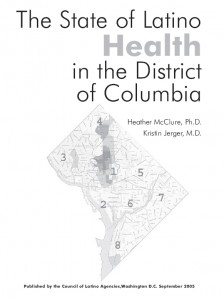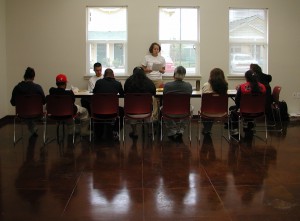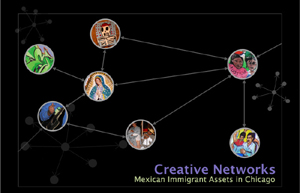Research
Dr. McClure is a Research Associate with the Oregon Social Learning Center’s Latino Research Team (LRT) and with the Anthropology Department at the University of Oregon (courtesy appointment). She received her doctorate from Northwestern University in 1999. For more than a decade she has been involved with community-based and policy research focused on health, human rights, and social networks in Guatemala and within Latino communities in the U.S. Her current work with the LRT focuses on behavioral, emotional, and physical health outcomes for Latino parents and youth in Oregon in two longitudinal studies (Charles Martinez, PI). Dr. McClure also investigates links among processes of adjustment to life in the U.S., discrimination, gender, and health, and she has led the team’s work to integrate stress biomarkers (e.g., cortisol and immunological markers), and anthropometric (e.g., height, weight) and health measures (e.g., blood pressure, glucose, cholesterol) into LRT research studies.
CURRENT RESEARCH PROJECTS
Latino Immigrant Stress and Health in Oregon
Since 2007, my LRT colleagues and I have collaborated with the Farmworker Housing Development Corporation, Josh Snodgrass of the University of Oregon, and Thom McDade of Northwestern University on studies of psychosocial stress and health among Latino immigrants. Our investigation of stress is informed by Bruce McEwen’s work that distinguishes between stressors and stress; “stressors” refer to the circumstances to which individuals are exposed, with “stress” reflecting the extent to which an individual is challenged to maintain function. In addition to a focus on acculturative stressors, our research pays particular attention to stressors related to discrimination, socioeconomic status, and social support/isolation in relation to physiological markers of stress and health measures. Self-report measures of stress are complimented by measures of neurophysiological function (cortisol), immune function (Epstein-Barr Virus Antibodies [EBV] and high sensitivity C-Reactive Protein [CRP]), and blood pressure. These measures of stress together provide a nuanced picture of how stress gets “under the skin” to affect Latino immigrants’ emotional, behavioral, and physical health.
This collaborative research was followed in spring 2009 by the pilot Stress and Acculturation Project involving Latina immigrant mothers and their young children (in the 1st to 3rd grades). This study incorporated similar measures to those described above to investigate parenting as a potential protective factor and buffer against the effects of psychosocial stress on the health of children of immigrants.
These studies were conducted with financial support from the National Institutes of Health, Oregon Social Learning Center, and the Center for Latino/a and Latin American Studies andDepartment of Anthropology at the University of Oregon.
Latino Family Acculturation and Youth Emotional and Behavioral Outcomes
Since 2005, I have worked closely with Charles Martinez (PI) andMark Eddy (Co-I) on the Adolescent Latino Acculturation Study(ALAS) and Latino Youth and Family Empowerment Study-II (LYFE-II). These studies are designed to learn more about how Latino families who have immigrated to the United States adapt to life in this country. Both studies examine the effects on families when children adapt or “acculturate” much more quickly than their parents. Key questions involve whether differences in parent and youth acculturation rates place children at higher risk for behaviors such as substance use, gang involvement, and poor performance in school. ALAS is a prospective longitudinal study involving 219 Latino immigrant adolescents (6th to 10th grades) and their parents. LYFE-II is an intervention study involving 238
Latino adolescents (50% foreign-born; 50% U.S. born) and their parents that is designed to test a culturally adapted parenting skills curriculum, Nuestras Families: Andando Entre Culturas (Our Families: Moving Between Cultures) to learn whether greater support for parenting can reduce substance use likelihood, boost youth academic achievement, and bolster other positive youth outcomes.

Policy report on Latino Health in Washington, DC based on collaborative research between the Council of Latino Agencies, the DC Department of Health, and the George Washington University Center for Global Health
Adolescent Behavioral Predictors of Elevated Adult Body Mass Index
I also work closely with Mark Eddy (PI) and Charles Martinez (co-I) on theLinking the Interests of Families and Teachers Prevention Program for Youth Antisocial Behavior (LIFT), a longitudinal study initiated in 1991 (n = 671 families). Our recent work focuses on adolescent behavioral predictors of increased adult body mass index (BMI). Obesity is a leading cause of morbidity and mortality throughout the world. Researchers increasingly emphasize obesity as a developmental condition, and recent studies indicate that behavioral distress in childhood may be linked to elevated BMI in adulthood. Findings from LIFT suggest that childhood and adolescent ADHD, depression, and conduct disorder may influence adult BMI through direct impacts on childhood and adolescent overweight, a condition which then persists into adulthood.
PREVIOUS RESEARCH PROJECTS
Latino Policy Research in Washington, D.C.: The State of Latino Health in the Nation’s Capital
From 2002-2004, I served as Director of Research and Policy for the Council of Latino Agencies (CLA), and was involved in the collaborative design and implementation of research projects with CLA’s 40 Latino-serving member agencies. In 2003-2004, I served as co-Principal Investigator for a Centers for Medicare & Medicaid Hispanic-Serving Institutions grant to support the two-year Latino Health Care Collaborative (LHCC) Project to conduct the first-ever household survey of Latino health status and access to health care in the District of Columbia (DC). The LHCC brought together CLA, the DC Department of Health, the George Washington University Center for Global Health, and three prominent Latino community health clinics, including Mary’s Center, Andromeda, and La Clínica del Pueblo. LHCC study findings informed the DC Department of Health’s Latino health priorities as part of their long-range planning process. The final report, The State of Latino Health in the District of Columbia, can be found here.
Cultural Assets and Social Networking among Mexican Immigrants in Chicago
|
In 2004-2005, I collaborated on Creative Networks: Mexican Immigrant Assets in Chicago, a joint research project of The Field Museum’s Center for Cultural Understanding and Change (CCUC) in Chicago, Illinois, and the Team Engineering Collaboratory (TECLab) at the University of Illinois at Urbana-Champaign. This study investigated the cultural, artistic and social networking assets of recent Mexican immigrants in the Chicago region, and was funded by The Rockefeller Foundation. This project documented the ways cultural and artistic practices contributed to identity formation, stronger collaborative bonds, renewed economic activity, and extended social networks for Mexican immigrants—all critical components of civic engagement. Ultimately, this research revealed that Mexican immigrants in Chicago possess a wealth of artistic and networking assets that contribute to the social, cultural and economic well-being of individuals, neighborhoods, organizations, and institutions in the Chicagoland area. The study website and our final report can be found here. |
Asylum Based on Sexual Orientation
Within the last several decades, countries around the world began to recognize gay and lesbian refugees, and offered them protection from persecution in their countries of origin. Since 1994, the U.S. has offered protection to asylum-seekers claiming well-founded fear of persecution based on sexual orientation. The recognition by the United States and other countries that gays and lesbians (and, increasingly, transgendered people) may be eligible for asylum as members of a “particular social group” is a simultaneous acknowledgment of established principles of international refugee law.
In 1996 and 1997, I conducted human rights fact-finding related to conditions for sexual minorities and people living with HIV/AIDS in Guatemala. Between 1996 and 2005, I provided expert witness testimony for 25 asylum based on sexual orientation cases in the U.S. In addition, I provided consultation for U.S. government agency trainings. In collaboration with Amnesty International experts, I co-trained U.S. Immigration and Customs Enforcement asylum officers on human rights conditions in Latin America. In collaboration with Harvard University researchers, I co-organized a health and human rights training for U.S. Agency for International Development core and mission staff.
Preparing Sexual Orientation-Based Asylum Claims: A Handbook for Advocates and Asylum Seekers can be found here. The updated handbook, Winning Asylum, Withholding and CAT Cases Based on Sexual Orientation, Transgender Identity and/or HIV-Positive Status can be
found here.


